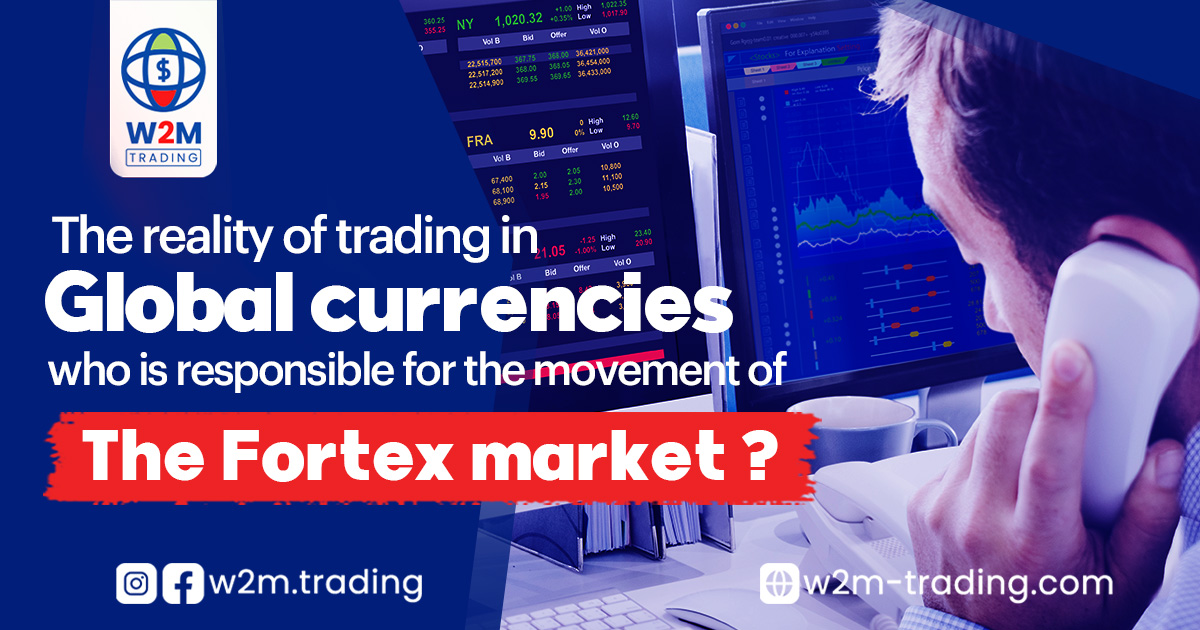- Attractive Education
- Beginner to Advance
- Flexible Timing

The Forex market (Forex Market) is the largest financial market in the world, with a daily trading volume exceeding $6 trillion. This market attracts millions of traders worldwide, from individuals to major financial institutions. But the question that always arises is: Who is responsible for moving the Forex market? Is it the central banks? The large investors? Or are there hidden forces controlling market trends?
To understand who controls the movement of the Forex market, we must first understand how it operates. The market functions in a decentralized system, meaning there is no central exchange as in the stock market. Trading is conducted electronically through a global network that includes banks, financial institutions, brokers, hedge funds, and individual traders who execute trades via various trading platforms. The Forex market relies on supply and demand, meaning that currency prices fluctuate based on the interaction of these different entities.
Central banks such as the U.S. Federal Reserve (Federal Reserve), the European Central Bank (ECB), and the Bank of Japan (BOJ) play a crucial role in moving the Forex market. These banks control interest rates and monetary policies, which directly affect currency values. For example, when the Federal Reserve raises interest rates, the U.S. dollar strengthens because investors are attracted to higher returns.
Large banks such as JPMorgan Chase, Citibank, and Goldman Sachs are among the biggest players in the Forex market. These institutions have massive liquidity and execute daily transactions worth billions of dollars, allowing them to influence prices. Additionally, they have strong analytical teams that rely on fundamental and technical analysis to make trading decisions.
Hedge funds are managed by top investors who aim to make significant profits from price fluctuations. These funds rely on High-Frequency Trading (HFT), where hundreds of trades are executed in a single second, contributing to rapid market movements.
Although retail traders do not have the same level of influence as major banks or hedge funds, they still make up a considerable portion of the market. These traders use platforms like MetaTrader 4, TradingView, and cTrader to execute their trades. They often rely on technical analysis and economic news to make their trading decisions.
Economic data such as employment rates, Gross Domestic Product (GDP), and inflation rates directly impact currency prices. For example, if the U.S. announces an increase in jobs, this strengthens the U.S. dollar, while a decline in employment weakens it.
Political events such as elections, trade wars, and economic crises significantly impact Forex. For example, the Brexit decision led to sharp fluctuations in the value of the British pound, while geopolitical tensions like the Russia-Ukraine war affect global currency and commodity prices.
Liquidity refers to how easily trades can be executed without impacting prices. Major currency pairs like EUR/USD and USD/JPY have high liquidity, meaning their spreads (the difference between the buying and selling price) are narrow. On the other hand, volatility refers to the degree of price fluctuations over a short period, which tends to increase during significant news events or economic crises.
The more demand there is for a particular currency, the higher its price, and vice versa. Investors monitor this relationship to understand price trends and take advantage of them. For example, if demand for the U.S. dollar increases due to a strong U.S. economy, its price will rise against other currencies.
Due to the massive size of the Forex market, it is extremely difficult to manipulate it on a large scale. However, there have been cases of price manipulation by some major banks. In 2013, a major scandal known as the Forex Scandal was uncovered, where several banks coordinated exchange rate prices to make illegal gains, leading to massive fines imposed on them.
If you want to succeed in Forex trading, you must follow economic news, understand monetary policy impacts, and develop trading strategies based on real data. Using both technical and fundamental analysis, along with effective risk management, will help you make more accurate trading decisions.
The Forex market is a complex combination of economic, political, and supply-and-demand factors. Central banks, major banks, and hedge funds are the most influential players in moving the market. However, retail traders can also benefit from its fluctuations through strong trading strategies. No single entity has complete control over the market; rather, it is an interconnected system that depends on the decisions of millions of traders worldwide.
If you are considering entering the world of Forex, it is essential to understand who moves the market and how you can use this knowledge to your advantage. Trading without understanding these factors is like sailing in an ocean without a compass—so prepare well, develop your skills, and keep up with market developments to achieve success.
The Truth About Forex Trading | Who Controls the Forex Market? | Only 1% Know About It
You can watch the video through the following link on our YouTube channel
You can also follow everything related to trading through the Forex Trading Educational Series for Beginners on our YouTube channel via this link
This site is protected by reCAPTCHA and the Google
Privacy Policy and
Terms of Service apply.